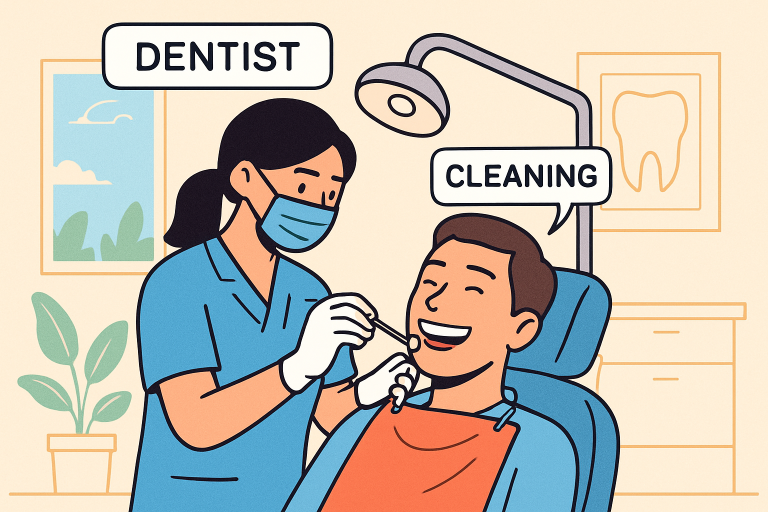Why Regular Dental Cleanings Matter
Routine dental cleanings, also known as prophylaxis, are professional treatments done by dental hygienists or dentists to remove plaque, tartar, and stains from the teeth. These appointments typically occur every six months, forming a cornerstone of preventive oral health care. While daily brushing and flossing at home are essential, professional cleanings reach areas that at-home tools simply cannot and help maintain a healthier smile.
The significance of regular dental cleanings goes beyond the visible benefits of clean, bright teeth. Professional cleanings help stave off gum disease, detect signs of decay before they become severe, and contribute to oral wellness. This shift from reactive dental care—treating issues only after they arise—to preventive care, addressing issues before they become serious, benefits your health and your wallet. Dental insurance programs, such as Delta Dental Insurance: FEDVIP dental plans, recognize this and often cover routine cleanings, making it easier for members to prioritize preventive care.
How Dental Insurance Encourages Preventive Care
Most dental insurance plans include coverage for routine cleanings at little or no additional cost. Preventive benefits are designed to incentivize regular visits to the dentist, which help reduce the risk of more serious and costly dental procedures later on. According to the National Association of Dental Plans, insured patients are 50% more likely to visit the dentist regularly than those without coverage, reflecting insurance’s positive influence on preventive care utilization.
When policyholders take advantage of these covered cleanings, insurers are also more likely to pay less for advanced treatments, aligning the interests of both the providers and the insured. This proactive approach to dental health is essential for improving outcomes and lowering long-term costs.
The Link Between Oral Health and Overall Well-Being
Mounting scientific evidence confirms that the mouth is not an isolated part of the body—oral health and systemic health are closely linked. Gum disease and chronic oral infections can release bacteria into the bloodstream, exacerbating conditions such as cardiovascular disease, diabetes, and even respiratory infections. The Centers for Disease Control and Prevention (CDC) highlights conditions like heart disease and diabetes that are impacted by poor oral health, underlining the critical importance of maintaining oral hygiene through routine care.
Routine cleanings also enable dentists to spot early warning signs of systemic conditions, such as autoimmune diseases or nutritional deficiencies, that may first manifest in the mouth. By safeguarding oral health, you’re also protecting your overall well-being.
Hidden Benefits of Routine Cleanings
Early Detection of Dental Problems
During a routine cleaning visit, dentists do more than just remove plaque. They examine the mouth for early signs of cavities, gum problems, oral cancer, and other potential issues that can be treated more simply and effectively if found early. This proactive approach can help patients avoid complex and invasive treatments down the road.
Savings on Future Dental Costs
Preventive visits help patients avoid larger problems that require costly restorative procedures like fillings, crowns, or root canals. Regular cleanings, often covered by insurance, save significant amounts of money over time by addressing issues early—before they escalate.
Increased Confidence and Quality of Life
A healthy mouth contributes to fresh breath, a sparkling smile, and greater self-confidence. Feeling good about your oral health can boost your overall quality of life, both socially and professionally.
Who Can Benefit the Most From Routine Cleanings?
Different Age Groups and Their Unique Needs
Routine dental cleanings deliver tailored benefits across the lifespan. Children and adolescents form lifelong oral hygiene habits and receive important preventive treatments like sealants and fluoride. Adults benefit by preserving oral health, saving on future care, and addressing the challenges posed by lifestyle, diet, or aging. Seniors especially require regular cleanings as dental risks increase with age, including gum recession and dry mouth.
Individuals with Chronic Conditions
Those with chronic medical conditions—such as diabetes, heart disease, or weakened immune systems—are particularly susceptible to oral health problems. Regular dental cleanings are vital for these individuals to manage their oral and overall health.
Common Misconceptions About Dental Cleanings
Myth: “Professional Cleanings Are Unnecessary If I Brush and Floss”
While excellent home care is the foundation of oral health, even the best brushing and flossing cannot remove all tartar and hidden plaque. Professional tools and trained clinicians reach surfaces and crevices that at-home routines miss.
What a Cleaning Includes
A professional cleaning consists of scaling and polishing teeth, checking for signs of gum disease, evaluating oral tissues, and sometimes administering fluoride or sealants. This comprehensive approach targets many oral health concerns, offering benefits far beyond what can be accomplished at home.
How to Make the Most of Your Dental Insurance Coverage
Schedule routine cleanings as recommended and double-check your plan’s preventive service schedule to maximize your benefits. Maintain a calendar reminder for check-ups and coordinate care so each member of your family gets timely cleanings. Some plans may allow two or even three covered cleanings per year; take full advantage of what’s offered. Review your plan’s coverage and network dentist lists to avoid unexpected out-of-pocket expenses.
Long-term planning should include maintaining good oral hygiene at home, promptly treating issues as they arise, and staying informed about evolving dental plan coverage.
The Future of Preventive Dental Care
As dental insurers increasingly recognize prevention’s medical and economic value, trends point toward enhanced coverage for cleanings and preventive services. Emerging research continues to reinforce the ties between oral health and overall wellness. For example, the NIH reports that maintaining periodontal health contributes to a lower risk of chronic conditions—information that shapes future dental plan offerings aimed at prevention rather than treatment.
As the emphasis on evidence-based prevention grows, dental insurance plans will likely expand benefits, making high-quality, preventive oral care accessible to more people than ever before.
READ ALSO: Your Ultimate Guide to Core Personal Finance Habits: Wheon.com Finance Tips for a Brighter Future

